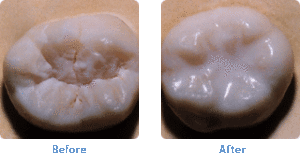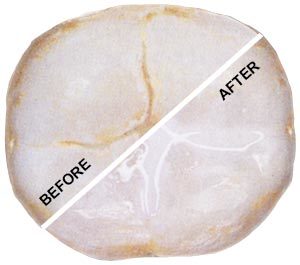 If you have a child, you know how hard it is sometimes to get them to brush their teeth properly. Yet, even when they do carefully brush and even floss, they may not reach the scraps of food that hide in the back teeth. Dentists say children are most likely to have problems cleaning this part of the mouth. This can lead to pit and fissure decay and serious cavities. You can prevent this occurring. Talk to a dentist about dental sealants.
If you have a child, you know how hard it is sometimes to get them to brush their teeth properly. Yet, even when they do carefully brush and even floss, they may not reach the scraps of food that hide in the back teeth. Dentists say children are most likely to have problems cleaning this part of the mouth. This can lead to pit and fissure decay and serious cavities. You can prevent this occurring. Talk to a dentist about dental sealants.
What Are Dental Sealants?
Dental sealants act as invisible protectors of your child’s teeth. They are very thin, clear or shaded plastic coatings. When placed on the surface of the teeth by a dentist, they bond to it. By doing so, they provide a protective coating that shields the teeth from tooth decay and the buildup of plaque. It will not affect the daily habits of your child. Your child can chew and drink normally knowing the sealant will protect the surface of the teeth. It will keep the bacteria and the sugars from clinging to the teeth causing decay.
Does Your Child Need Sealants?
Your child may need sealants if they have back teeth with pits and grooves. These are the hardest for anyone – child or adult, to reach. Dentists agree that while most children can benefit from sealants, certain children are more at risk than others are. Since the teeth most affected are six-year and twelve-year molars, these are the ages of the greatest concern. Your dentist may decide, depending upon the condition of the teeth at these ages, that a sealant would be the most effective way of reducing the risk for cavities and other teeth-related problems.
Understanding Sealants
The dentist will apply the sealant during a single visit. This will reduce the risk of anxiety a child may feel from such a visit. The process is a simple one consisting of three steps. The dentist will:
- Dry and condition the tooth or teeth
- Apply the sealant
- Allow the sealant to harden
What you need to understand is that sealants are an effective means of reducing the risk of cavities. They can also reduce the potential for visits to a pediatric dentist. However, this is not a permanent solution. Sealants last between 5 and 10 years. Your dentist needs to check them regularly to ensure they do not require reapplying or fixing. As with all dental treatments, it is always very important to follow up with good dental hygiene practices at home. The life of a sealant is also longer if the child or adolescent visits the dentist regularly and avoids chewing on such things as ice cubes. These hard items can harm the sealant making it less effective against cavities.
If you want to learn more about sealants and your child, talk to us, and schedule an appointment today with the best dentist in New York City.
Contact the best dentist in Staten Island at 718-535-1196 to get the treatment and care you need as soon as possible.
